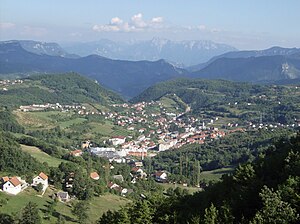Operation Alfa
| Operation Alfa | |||||||
|---|---|---|---|---|---|---|---|
| Part of World War II in Yugoslavia | |||||||
 View of Prozor |
|||||||
|
|||||||
| Belligerents | |||||||
|
|
|
||||||
| Commanders and leaders | |||||||
|
|
|
||||||
| Units involved | |||||||
|
|
|
||||||
| Strength | |||||||
|
|
|
||||||
| Casualties and losses | |||||||
| 543–2,500 Croat and Muslim civilians | |||||||
|
|
|||||||
Operation Alfa (Italian: Operazione Alfa; Serbo-Croatian: Operacija Alfa, Операција Алфа) was an offensive carried out in early October 1942 by Italian, Croatian and Chetnik forces against the communist-led Partisans in the Prozor region (today in Bosnia and Herzegovina), then a part of the Croatian puppet state, the Independent State of Croatia (NDH).
The operation was arranged between Generale designato d'armata (acting General) Mario Roatta, commander of the Italian Second Army, and Chetnik commander (vojvoda) Ilija Trifunović-Birčanin with approval of Chetnik leader Draža Mihailović. It was carried out in coordination with the Germans and included elements of the Croatian Home Guard and the Croatian Air Force. Faced with heavy weaponry and heavily outnumbered, the Partisans retreated and left Prozor. Chetniks under the command of Dobroslav Jevđević and Petar Baćović then massacred between 543 and 2,500 Croats and Muslims, and destroyed numerous villages in the area. Following protests from both the Italians and the Croatian authorities, the Chetniks were discharged or relocated. Italian and NDH forces followed up Operation Alfa with Operation Beta, which was focused on capturing Livno and surrounding localities. Baćović was killed by NDH forces near the end of the war, while Jevđević escaped to Italy and avoided prosecution by the new Yugoslav government. Mihailović was captured by the communists following the war, tried and found guilty for the Chetnik actions at Prozor (among other charges), and was sentenced to death and executed.
...
Wikipedia

